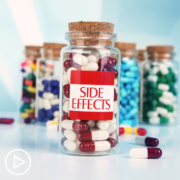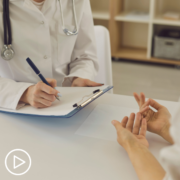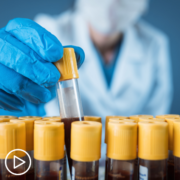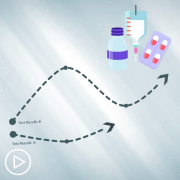How Are CLL Symptoms Treated?
How Are CLL Symptoms Treated? from Patient Empowerment Network on Vimeo.
Dr. Jean Koff reviews common CLL symptoms and explains why patients should discuss any issues they experience with their healthcare teams.
Dr. Jean Koff is an Assistant Professor in the Department of Hematology and Oncology at Winship Cancer Institute of Emory University. Learn more about Dr. Koff, here.
Related Resources:

|

|

|
Transcript:
Katherine Banwell:
One part of thriving with CLL is managing the symptoms of the disease. What are the common symptoms of CLL?
Dr. Jean Koff:
So, one thing that I see with nearly all of my CLL patients, regardless of where they are in the CLL journey, and regardless of whether they need active medications to manage their CLL, is some degree of fatigue. And this can range from just mild fatigue that patients notice that they need a little bit of a breather in the middle of the day, to needing more sleep at night, to not being able to exercise as much as they’re used to. And that is by far one of the most common symptoms we see. Again, whether or not their disease needs medication to manage it.
The classic symptoms of CLL that often let us know that it’s time to start medical management are not just this fatigue. But the classic symptoms are B symptoms. And we describe those as fevers, night sweats, and unintentional weight loss. Those are very common. And then some patients with CLL will also have what we call palpable lymphadenopathy, which is our term for lymph nodes that are enlarged that you can feel. And the most common places to feel these on the body are on the neck, under the arms, and in the groin.
Katherine Banwell:
Okay. How are symptoms treated?
Dr. Jean Koff:
So, if your symptoms progress to the point that your doctor thinks you need medication – they’re becoming disruptive to your life, or they are getting worse and worse over time, then there are a variety of medications that we can use in CLL. And this is actually a very exciting field. Right now, the state of the field is that most patients who are starting on their first treatment for CLL will use some sort of oral medication, and that may be accompanied by an IV – what we call monoclonal antibody, or it may not. But one thing that has really changed even since I very first started practicing, is that we no longer commonly use what I would call conventional chemotherapy to treat CLL – even though this was the standard of care just a few years ago.
Katherine Banwell:
Wow. So, a lot has changed.
Dr. Jean Koff:
Yes, definitely.










